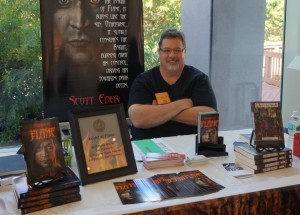A guest post by Petra Klarbrunn.
Most beginning authors I know think that a mentor is someone who will look over your latest screed and give you feedback and editing suggestions. While it is something that a mentor may do for you, that’s actually the job of an editor and/or critique group.
So what does an author mentor provide? I’m glad you asked.
- Questions at all stages. As mentioned, you might be lucky enough to have a mentor who has enough time to read over your epic novel. The majority of mentors are working professionals, so they’re busy working on their own epic space opera trilogy. They don’t have time to line edit your work. They do make time to answer specific questions for you. Say you’re having a problem with your opening hook. You can ask your mentor to look at a couple of paragraphs and get feedback from someone who knows how to write opening lines that propel the reader forward. Even better, they can provide a couple of different takes and have them go over why one is better than the other.
- Contracts. Mentors can give you some feedback on contracts, explaining what the egregious portions are and what they actually mean. They may suggest contract modifications or recommend that you take the contract to a specialist lawyer, especially if the contract is from one of the Big 5 publishers.
- Plotting. Some mentors can go over your plot outline and make suggestions. One of my mentors found a serious flaw in a novella that would have had me spinning my wheels for weeks until I discovered it. Don’t send a forty-page plot outline to your mentor. Send a bullet-point list so they can see how you build up towards the third act.
- Networking. Often overlooked, having someone who can provide introductions within your genre can give you a leg-up on your peers. One of the complaints about writing is “it’s about who you know that counts.” While exceptional writing can do your introductions for you, getting introduced to a busy editor at a convention or via email can at least give your work a better chance at getting looked over by a publisher. Introductions can also provide opportunities to get into anthologies or to work on collaborations.
- Blurbs. Receiving a blurb from a bestselling author or a celebrity can push your work to the top of the shopping cart. Stephen King gave a relatively unknown author named Jack Ketchum a glowing blurb and recommendation. Now Mr. Ketchum is a bestselling author and screenwriter.
- Giving back. Most mentors say that the main reason they choose to be a mentor is to give back to the community. Because most authors are genuinely nice individuals, they want others to succeed. Sometimes mentors didn’t have anyone they could ask questions of, and they want to help new authors with the craft. And who knows? Perhaps one day they will ask their mentee for a blurb or two.
Petra Klarbrunn Bio: Petra battles with her four cats daily for the use of her laptop. She writes in the romance, erotica, bizarro, horror, and academic fields using multiple pseudonyms. Her diet consists mainly of tofu and espresso.

 e I am, the lone wolf…er…author in one of my happy places—a small local Con. Surrounded by my Knight of Flame regalia, I’m ready to greet the horde of potential readers. I’m a newbie though, with only a small number of titles to my name. Still, I love to get out there and mix it up with fandom and authors.
e I am, the lone wolf…er…author in one of my happy places—a small local Con. Surrounded by my Knight of Flame regalia, I’m ready to greet the horde of potential readers. I’m a newbie though, with only a small number of titles to my name. Still, I love to get out there and mix it up with fandom and authors.